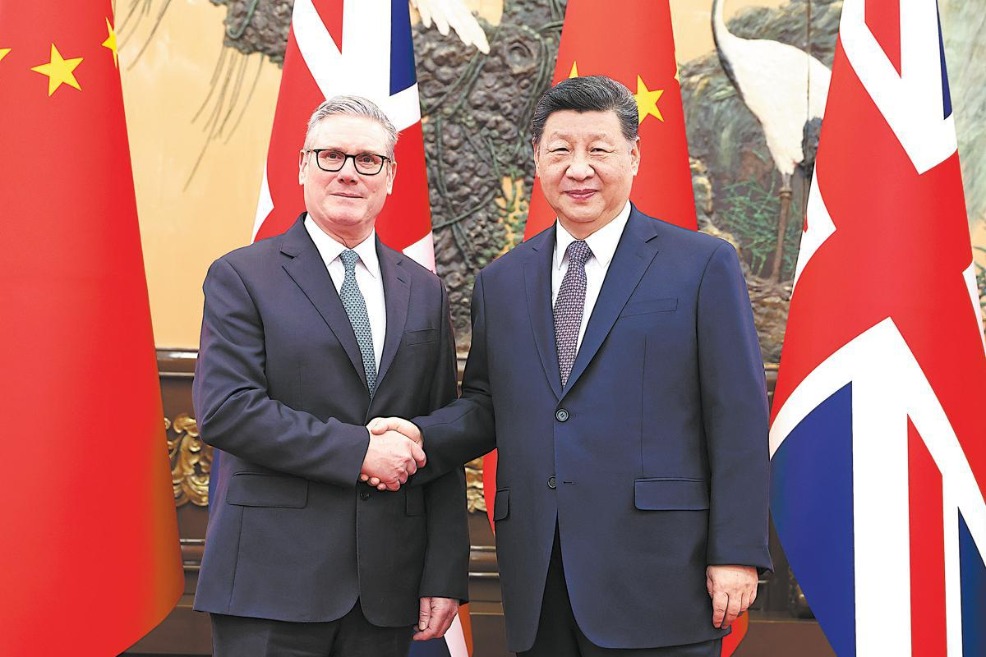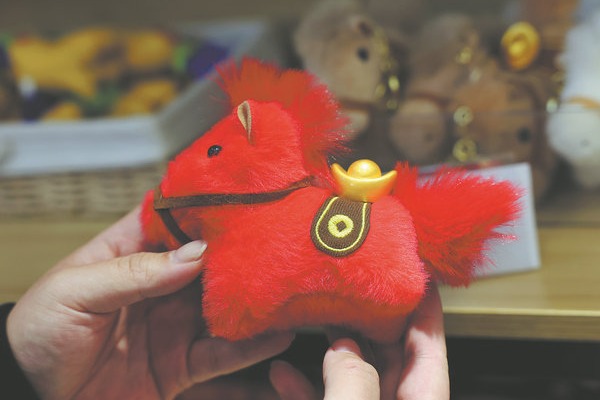LIFE MADE EASIER FOR FRAIL SENIORS
Dedicated teams assist with showers and hospital visits

Everyday tasks taken for granted by others can pose obstacles to frail seniors, miring them in misery.
With China's elderly population expected to expand rapidly, many people aware of seniors' urgent needs are taking action to help them.
Last year, Li Minhua, who is in her early 40s, began helping seniors in Beijing with her shower assistance service, with many of her clients treating Li as their own daughter.
A few years ago, she noticed just how desperate her mother was for a shower after her parent was involved in an accident.
"She had to lie in bed, unable to move around for six months, and I didn't want to take any risks in giving her a shower," she said.
Li was hampered in efforts to help her mother due to a lack of special equipment and professional assistance, which prompted her to research ways to help seniors take showers.
"In extreme cases, some of them haven't taken a shower for two or three years," she said.
According to a survey by the China Research Center on Aging, taking a shower was the biggest problem among six daily self-care activities for the elderly with disabilities. The other five were dressing, eating, going to the toilet, getting in and out of bed, and other indoor activities.
However, there were few specialized businesses in Beijing offering a one-stop service for bathing, scrubbing and showering those in need.
Li said, "No matter if it was a nursing home or a carer, most of them merely provided help that scratched the surface, such as a simple hip bath or scrubbing."
Educated in the Japanese language at Dalian University of Foreign Languages, Liaoning province, Li made a point of talking to Japanese shower service providers.
"The shower assistance culture is prevalent in Japan," she said, adding that this inspired her to tap the niche market in Beijing
After learning about Japanese professional shower assistance procedures and standards, Li bought two water pumps and inflatable bathtubs when she set up her own business in March last year. This equipment enables the elderly to lie down comfortably during a bath, as most of them are unable to stand or sit up.
"The key is reducing the distance as much as possible in which those taking a shower have to move," Li said.
Problems observed
Wang Xiangjun, who works at a nursing home in the Chinese capital's Chaoyang district, saw the problems that more than 400 elderly families in her care had in taking a shower.
"It's hard for them to move to the bathrooms, most of which are small, wet and slippery, and very likely to cause accidental injuries," Wang said.
Two or three people are typically involved in the procedure required for the elderly to take a shower.
An assistant first takes the blood pressure and temperature of seniors and gains a good understanding of their basic health condition.
Li said, "If they are intubated, have high blood pressure or fever, we can't proceed in case of possible infection, which would make things worse."
The longest procedure involves preparing water to fill the bath tub. It usually takes 15 to 30 minutes to collect about 180 liters of water and maintain it at 40 C.
"The volume in most cases is way beyond the capacity of a household water heater, so we need to prepare extra hot water," Li said.
Waterproof covering for the floor, an inflatable tub, a disposable bath bag, and herbals are then put in place before the water is pumped into the tub.
When all the preparations are completed, it usually takes two assistants to carry the senior carefully to the tub.
"First-time customers are usually nervous, so we need to relax them by talking to them and comforting them," Li said.
Clients take a 10-minute bath, before an assistant starts to wash, scrub and shower them. The entire process takes about 90 minutes and costs around 400 yuan ($56).
The first time Li helped bathe a senior made her determined to persevere with her business. "The client was an 85-year-old man who had lost the ability to communicate," she said.
Li remembers the stifling air in the room and the client's sticky skin, the latter being the result of a long-term inaccessibility to bathing.
"To be frank, it was hard to take it all in, but you can imagine what this man must have had to put up with for this length of time," she said.
Li's initial embarrassment gave way to a sense of achievement and pleasure after the man was bathed and scrubbed. "You could tell from his look that he was relieved and happy," she said.
The experience gave Li a new understanding of aging. "I really feel that the elderly with disabilities need care and attention from more people. They also need a decent life," she said.
Li has recruited six members to her team, which has served more than 300 households with elderly family members who have difficulty taking a shower.
About 80 percent of Li's clients now take a shower at least once a month thanks to her service, and her most frequent customers call her every week.
Her team can deal with five to six families a day if they live relatively close to one another.
Although Li has yet to make much of a profit from her business, she said she will continue this work to nurture the market. "As long as I get to keep my team, things will surely fall into place," she said.
Rising population
There are 264 million people on the Chinese mainland who are 60 or older, accounting for 18.7 percent of the total population, according to the National Bureau of Statistics, and the number is expected to surpass 300 million by 2025.
The number of frail seniors over the age of 60 who experience difficulty in performing everyday tasks passed 42 million in 2020, according to the National Working Commission on Aging, meaning that one in six people who were 60 or older were unable to take care of themselves.
Since the start of last year, Liu Shanshan has worked as a medical guide after finding that many seniors were struggling to find their way around hospitals in Shenyang, capital of Liaoning province.
She noticed the problem when a distant relative from outside the city arrived on her own to seek medical treatment.
"The elderly are not familiar with hospital procedures, especially those who have just arrived in the city unaccompanied by their children," Liu said.
She also noticed that many elderly patients besieged reception desks, asking how to download hospital software, make registrations and print medical records.
Many younger family members unable to accompany their parents to hospitals have sought help from Liu's service online.
Some seniors faced emergencies in the middle of the night, when their children were not around. The children are often either overseas or unable to get off work in time to help their parents.
After contacting a client's child, Liu obtains the medical records needed for a hospital visit. She accompanies her clients from the moment they leave home, and prepares emergency medical supplies for them, which she carries in her backpack.
At the hospital, Liu consults a doctor about a client's needs, carefully taking note of the advice given before passing it on to the customer's family members.
"To be professional, you have to be meticulous with the details. The bigger a hospital is, the more patients there will be, and the more complex the procedure," Liu said.
She said it can take all morning visiting various departments to wait in line for registration, a doctor's diagnosis, blood tests and CT scans.
This physically demanding experience means that the work of Liu and others is essential for many seniors.
Liu also studies in advance the medical procedures her clients need to undergo.
"They have to avoid urinating before an ultrasound examination, taking medicine before an examination of the upper gastrointestinal tract, and eating before a blood test," she said, adding that elderly patients have to be reminded to bring their ID and medical insurance cards to the hospital.
A year's experience means that Liu can now complete the entire hospital process in two hours.
She thinks that the key to her work is being caring, patient and responsible. Sometimes, she is tasked with acting as a friend of clients' children, who fear their parents will be reluctant to use Liu's service, as they are unwilling to spend their money.
Liu hopes the market for senior medical care will develop in an open and healthy manner, and that she will be able to help add value to her trade.
To address the aging population, the State Council has released a development plan for China's elderly care services during the 14th Five-Year Plan period (2021-25).
The plan specifies major goals and tasks, including expanding the supply of elderly care services, improving health support for seniors, and advancing the innovative and integrated development of service models.
To mobilize society in actively responding to the aging population, the plan lists nine key indicators, such as the number of care beds and the proportion of nursing care beds in care institutions.
Detailed tasks include strengthening the "safety net "for services for the elderly, expanding coverage of inclusive services, developing the "silver economy", and safeguarding the legitimate interests of the aging population.
According to the plan, China should give full play to state and social capital in expanding the domestic market, and create systematic, integrated policies to ensure the sound and sustainable development of the silver economy.
Good listener
Last year, Tang Bo resigned from his job at a State-owned company to join Li Minhua's team in Beijing.
The 38-year-old, who was raised by his grandparents, carries elderly clients to the bath. He has gained an affinity for seniors and enjoys helping them. For example, he is good at communicating with the elderly during the bathing process.
"Most of them are lonely, and they are happy when I listen to their stories from the past," said Tang, who was touched when an elderly client with Alzheimer's disease remembered his name after Tang had assisted him four or five times.
Every time Tang sees elderly clients smile at him after he bathes them and receives recognition from their family members, he said he gains a strong sense of his work's social value.
"Unfortunately, my grandparents are gone. If they were still alive, I would certainly give them a bath in person," he said with a touch of regret.


Today's Top News
- Building shared skills for shared growth with BRI partners
- Xi chairs CPC leadership meeting to review report on work of state institutions, secretariat of Party Central Committee
- China's transport sector sees growth in 2025
- Politicizing business cooperation undermines shared interests
- High-profile visits signal pivot by EU
- Nation gears up for Spring Festival rush






























